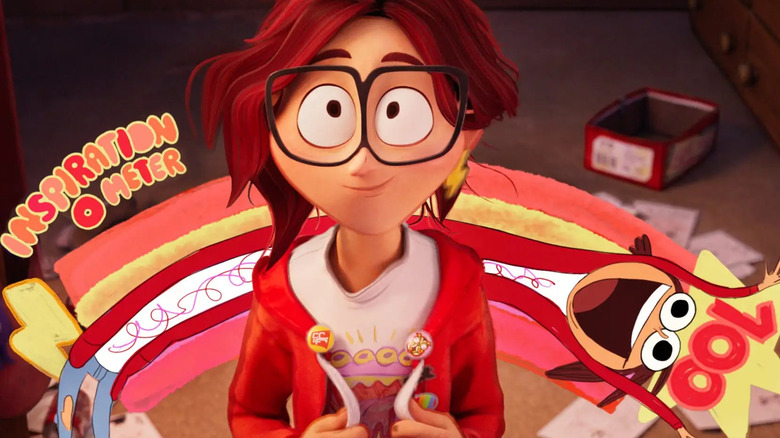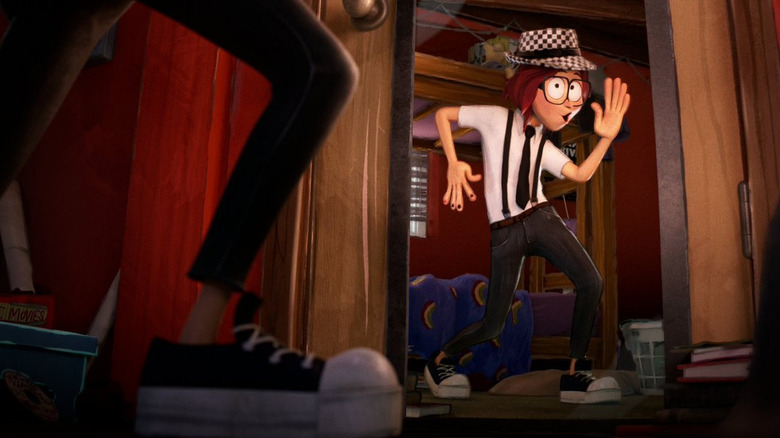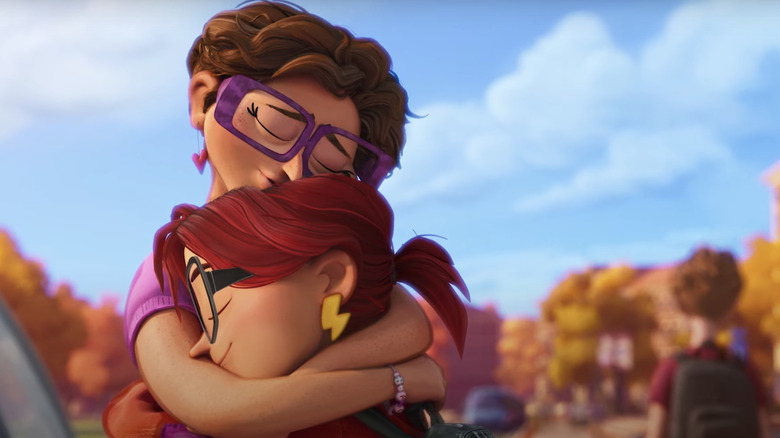How The Mitchells Vs The Machines Formed Katie's Queer Identity
There's never a bad time to sing the praises of "The Mitchells Vs The Machines," a breathtaking work of animation that chronicles a robot uprising through the lens of a dysfunctional family road trip. Part action-adventure and part family drama, the refreshing apocalypse tale showed off its exhilarating visual style with a sweet, heartwarming story, so no wonder it captured so many hearts. Then there's the fact that this film boasts something that remains exceedingly uncommon in animated studio films: a queer lead.
The film follows Katie Mitchell (voiced by openly queer actress Abbi Johnson), a quirky, aspiring filmmaker who clashes with her technophobe Dad and is impatiently awaiting the day that she'll finally find "[her] people" at art school. Her primary obstacle — besides the robot overlords — is her father and his inability to understand her art. Her queerness isn't the point of this story, but her identity certainly is — Katie is looking forward to finally finding herself in college and becoming the filmmaker she's always planned to be. For queer folks used to hunting down the clues to headcanon our way into representation, "Mitchells" doesn't hold back — there are hints everywhere. One scene sees Katie sport a rainbow pin on her hoodie and another, running down her filmography, includes a split-second promposal video titled "Chloe Chang Will You Go Out With Me?" If the movie stopped there, Katie's queerness could be something true, but easy for some to ignore (sound familiar?) — except this is a rare occasion where that isn't the case. These momentary acknowledgments are beside the point: Katie isn't queer because a glimpse of a rainbow pin lets us know, but because it's a part of her identity, inseparable from her journey.
A protagonist of our time
For LGBTQ+ animator Lizzie Nichols, she recognized queerness in Katie even before those small details were incorporated into the story. When "The Mitchells vs The Machines" was in the early stages of production, Nichols saw the storyboard screening and convinced the director Michael Rianda to let her work on the film. Shortly after joining the crew, she came to a realization which she later shared with Insider: "Katie seems kind of queer to me." But at the time, Nichols kept the observation to herself, explaining, "In a way, sadly, I internalized like, well that can't happen so I'll just keep that quiet in my mind, that I think Katie's queer."
In the wide world of big studio animation, queer characters are a rarity. Big strides have been made on the small screen, thanks to TV series including "The Legend of Korra," "She-Ra and the Princesses of Power" and "Steven Universe." But in comparison, animated films have been taking their sweet time. Disney seems to announce its first gay character in every other film, and it usually amounts to no more than a passing moment, easily edited out of the film when it debuts abroad. Queer-coded characters are a whole other beast, but openly acknowledging the queerness of a major player in a film? No way. Even bigger — the lead character in a film getting to voice their queerness? That seemed so unthinkable to Nichols that she didn't bother bringing it up. But unbeknownst to her, it was already a conversation in "The Mitchells Vs The Machines" writers' room.
Getting to know Katie Mitchell
Writers Mike Rianda and Jeff Rowe are straight cis-men, but while developing "Mitchells," Rianda realized that he was basing Katie's character on queer women in his life.
"I noticed all the people I was basing Katie on were queer to the point that people on the movie started asking, 'Is Katie gay?' And I was like, 'Are we allowed to do that?'"
In chatting with queer crew members, the duo received nothing but encouragement. In fact, the only doubts that arose just proved how crucial this decision would be. Like Nichols, others worried that a queer lead simply wouldn't be approved and as the lead creatives on the film, Rianda and Rowe saw this as just another reason to charge forward: "When people were like, 'Well, they will never let us do it,' it was like we are they. We are the decision-makers in the room. We can either choose to do this or not."
In the end, this was no small feat. As Nichols, voice actress Abbi Johnson, and numerous fans of the film would go on to point out, having a character like Katie onscreen in all her glory is incredibly meaningful. While hosting a Netflix panel with the team behind "The Mitchells Vs The Machines," Rebecca Sugar ("Steven Universe") spoke to this when she said,
"The exclusion of queer characters in stories and in media for kids has really alarming implications. Queer kids are essentially told during their formative years that they don't or shouldn't exist. And so that's why it was so exciting for me to see, in this film, a central character be confirmed as queer onscreen. This is a big first and it speaks to the barriers that are being broken."
The fight to get Katie onscreen
In a just world, it would be enough for Rianda and Rowe to make Katie canonically queer and simply incorporate it into the story. Alas, our world is broken and they had a few more hoops to jump through first — namely, they needed approval from the Sony executives. So when the time came, Rianda turned to Nichols and a number of other LGBTQ+ artists on the film who decided to write letters to Sony explaining the importance of Katie's queerness. Rianda has since named Nichols' letter as a standout, and even shared it on Twitter. Like an absolute badass, she ended the letter with a rallying call:
"Our rights are always under attack, especially from a terrifying right-wing fringe that is gaining power and influence in this country. We do not want to bend to their will, no matter how loud and scary they sound.
We do not want to silence ourselves for fear of a bigoted few. We don't want to cave to their worldview. We have to be on the side of what is right and just. We just need the backbone to do it.
Be that backbone."
This is how Katie's queerness came to be: a natural realization that made its way to screen thanks to the work of passionate, dedicated artists.


